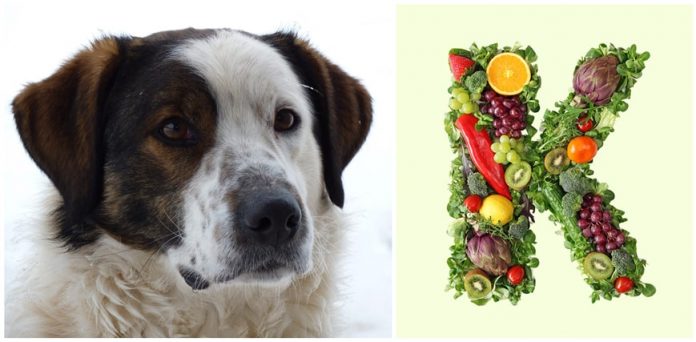
Vitamin K is primarily used in treating rat poisoning in dogs. This is because Vitamin K reverses the anticoagulant effect of the toxic substance. But did you know that it can do so much more inside the body, aside from clotting and thickening the blood?
This is the reason why many dog owners also offer their pets foods rich in Vitamin K. Continue reading to know more about Vitamin K, its importance in dogs, as well as the best sources for them.
What You Need to Know About Vitamin K
Vitamin K is a group of fat-soluble vitamins required for normal blood coagulation. Aside from its role in blood clotting, it also helps in activating many enzymes inside the body. It is important in metabolizing protein as well as binding calcium in the bones.
Vitamin K has five different forms, but only two are commonly used in dog products. These are the phylloquinone or the Vitamin K1 and the menaquinone or Vitamin K2. The third form, Menadione or Vitamin K3, is the synthetic form and is said to be toxic to dogs.
Vitamin K1 for dogs is the type often used in treating rat poison ingestion. If your pet ingested a rodenticide, he has to undergo Vitamin K therapy. In natural form, this can be derived from plants, particularly from leafy greens.
Other Uses of Vitamin K for Dogs
Apart from being an effective treatment for rat poisoning, Vitamin K has a lot more uses in dogs. Here are some of them:
- It is being used as a treatment for hypoprothrombinemia, a condition due to either the lack of enough Vitamin K or deficiency in the prothrombin in the liver.
- It can be used for dogs with cancer that are already urinating blood. There are already dog owners who give Vitamin K to their pets, in hopes that it could help with different types of cancer such as liver cancer.
- It has positive effects on the heart. Many studies are linking Vitamin K to cardiac health. It is said to be effective in preventing heart diseases.
- It may be useful for oral health. Studies suggest that Vitamin K2 comes with a lot of positive effects on dental health when combined with Vitamins A and D.
- It is important for your pet’s bone density. Vitamin K2 plays a role in activating bone metabolism through osteocalcin, which is responsible for stimulating the development of new dentin in the teeth.
Vitamin K Therapy for Dogs
The truth is your pet’s body is capable of producing its own Vitamin K. The only time dogs become Vitamin K-deficient is if they ingested substances such as a rodenticide or rat poison that can hinder its production.
Rat poisoning in dogs is one of the most common concerns reported in animal poison control centers. This is because it’s so easy for dogs to get a hold of rodenticide. Your pet might get it from anywhere in the house, the trash bag, from other people’s house, or from your yard.
For long-acting rodenticides, such as bromadiolone, cholecalciferol, and aluminum phosphides, a dog has to be on Vitamin K treatment for a month. Because these types of poison restrain the blood from clotting, a dog has high chances of suffering from internal bleeding.
If it’s Warfarin, your pet’s treatment will likely take place for only a week. This is a first generation version of the long-acting rodenticides, which means it is not as potent as the new rat poisons.
When the ingestion of rat poison only happened a couple of hours before, it’s still safe to perform induced vomiting. You could either call your vet immediately or seek help from an animal poison control center for further assistance in performing emesis.
Unfortunately, Vitamin K is quite costly and not all dog owners can offer a month-long treatment using the drug. If you believe your dog only ingested an insignificant amount, request a blood test first before proceeding with the treatment right away.
Dog owners should be extra careful in using rat poison, especially if they have pets that tend to eat anything. Part of this is making sure that the bait station is well-secured.
Vitamin K Dosages for Canines
According to the Cornell University College of Veterinary Medicine, the initial dose for dogs should be 2.2 milligrams for every kilogram of weight.
It should be followed up with 1.1 milligrams per kilogram of weight until the active bleeding stops. Your vet will then prescribe an oral Vitamin K1 two times a day on the same dose.
Natural Sources of Vitamin K for Dogs
- Fish – seafood such as mussels, scallops, and lobster all have Vitamin K but in low amounts. The highest concentrations can be found in fatty fish such as tuna, mackerel, and salmon.
- Meat – most dogs love meat and when it comes to Vitamin K is on the top of the list. If your pet does not like the taste of liver, you can give him beef and pork. Duck and goose meats are also packed with Vitamin K.
- Kale – dubbed as one of the best sources of Vitamin K, a cup of fresh kale has as much as 215 micrograms of the nutrient. For dogs, a small amount of kale on occasion would not hurt. You can make some chips for your pet using kale.
- Spinach – this vegetable is safe for a dog’s consumption as long as it was cooked without salt and pepper. Your pet will find it hard to digest raw spinach so better cook it first.
- Eggs – you can offer your pet a few eggs during a week. Just make sure to offer them without seasonings such as salt and pepper to make it a healthier meal for your pet.
The Bottom Line
Vitamin K is an important vitamin for dogs because it guarantees that their blood coagulates normally. It is also commonly used as an antidote for rat poisoning. If you suspect your pet just ate rat poison, it’s important to have him checked by a vet first. Your vet will be able to tell you how to give the vitamin to your dog as well as its proper dosage. During this time, you could also serve your dog Vitamin K-rich foods, such as eggs, fish, and meat.




















